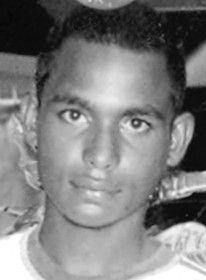Ramesh Sawh was found hanging by his jersey in the lock-ups at the Enmore Police Outpost in January 2008, and a Coroner’s Inquest has found that a police constable on duty at the time was criminally concerned due to procedures not being followed.

The hearing before Magistrate Sherdel Isaacs-Marcus at the Cove and John Magistrate’s Court wrapped up on Monday last and a jury has concluded that the police officer’s conduct resulted in Sawh’s death. The file has been forwarded to the chambers of the Director of Public Prosecutions (DPP) for advice.
The jury found that Sawh was not informed of his rights [on detention] based on regulations, and that regular checks which were expected to be done every half hour were not carried out. It was revealed that from the time Sawh was put into the cell up until the discovery of his body, two hours had elapsed without checks.
Sawh called ‘Kenny’ had been arrested pending investigations into a report of larceny of a motor vehicle battery. He was booked at the station at 11:30 am on January 17, 2008 and was later discovered dead at 1:30 pm. He was alone in the cell at the time.
The police through the Office of Professional Responsibility had launched an investigation into his death, after his relatives alleged that he had been beaten while in custody, but later said that they found no evidence to substantiate the allegations. Sawh’s relatives continued to reject claims that the police were not culpable and filed an action in the High Court requesting that an inquest be held. The order was subsequently made by Chief Justice (ag) Ian Chang.
The inquest was held to determine the date Sawh died, where he died, by what cause, and whether any persons were criminally concerned in his death. Four persons sat on the jury, according to information from the court.
Police witnesses, among others, testified, specifically the two officers on duty at the station when Sawh was discovered dead. The constable who was found criminally concerned testified that he made no checks on Sawh after placing him in the lock-ups, and that he only made the discovery when another prisoner was about to enter the cell.
“As I was about to open the bottom lock-up I discovered Ramesh Sawh with his jersey tied around his neck to the grill. He was slinging about seven inches from the ground”, the officer told the jury.
A police corporal who the jury cleared of being criminally concerned in the case testified that he had seen Sawh’s hands through the cell door sometime between the period he was placed there and when he was discovered dead. He said that he did not open the door to investigate at the time.
The jury also heard that the photographer who took photographs for the police at the scene misplaced his camera, and that he later recovered the camera but the photographs had been deleted.
Deliberations
The jury was told that Sawh died from asphyxiation due to ligature compression which caused a lack of oxygen. The post-mortem report had stated that asphyxiation was due to hanging. No injuries were found on his body.
In deliberating, the jury had to decide whether the officers on duty at the Enmore lock-ups were under a legal obligation to Sawh, and whether they had wilfully or deliberately left that duty underperformed. According to information from the court, they were asked to determine whether as a result of the duty not being performed there had been an acceleration of the death of Sawh. Further, they had to determine whether the conduct of the officers or their failure to act, caused the result- Sawh’s death.
The issue was whether the officers had a duty to make regular checks on the prisoner and if so, at what intervals. A senior police officer had testified that checks are required to be made every half an hour.
The jury then concluded that only one officer was criminally concerned in the death due to procedures not being followed by the police.
Justice
The verdict was accepted by Sawh’s relatives as “justice finally being served.” The dead man’s mother, Indrouttie Sawh, told Stabroek News that she had been discouraged from pursuing the matter because fighting the police force seemed like a hopeless battle. But she said she pressed forward for her son and mothers who have suffered a similar fate.
The family fought for an inquest, the mother said, because they were suspicious of the circumstances surrounding his death.





